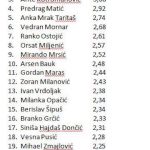
ZAGREB, Dec 10, 2020 – Croatia annually loses a town the size of Metkovic, Virovitica or Samobor as 24,000 people are diagnosed with malignant diseases each year and 14,000 die, Dragana Jeckov of the Independent Democratic Serb Party (SDSS) warned in parliament on Thursday.
Jeckov was speaking during a debate on the proposed national strategy for cancer prevention, which received the undivided support of parliamentary groups and individual MPs. She said that the fight against cancer was not a political or party issue but a safety issue that required a consensus.
Jeckov said she was aware that the proposed framework would not eradicate cancer, but would reduce negative trends, show patients a clear way through the healthcare system and reduce the healthcare system’s costs.
Ivan Celic of the ruling Croatian Democratic Union (HDZ) also noted that the national cancer prevention strategy was an above-party issue. He said that today was a big day because cancer patients and their families were being given hope.
“We believe that this document will help in detecting this disease as early as possible and treating it as successfully as possible,” Celic said, calling on his fellow lawmakers to support a campaign for free transport of cancer patients launched by the “We Are Not Alone” NGO. “If we support it together, the Croatian Health Insurance Fund will quickly finance free transport for cancer patients,” he added.
The Social Democratic Party’s (SDP) Renata Sabljar Dracevac and Andreja Maric put emphasis on developing a network of oncology physicians, making it possible for cancer patients to be treated as close to their homes as possible, and on national early cancer detection programmes.
“Croatia is among the five worst countries in the EU in respect of the cancer survival rate, which is why the proposed framework is important,” Bridge’s Bozo Petrov said, adding that in 2016 the cancer incidence rate was 214 cases per 100,000 people in the EU and 321 in Croatia. He resented the fact that this document had sat in the Health Ministry’s drawer for three years.
“We have been waiting for this document for 30 years and Health Minister Vili Beros unquestionably deserves credit for it,” said Milan Vrkljan of the Homeland Movement. He said that this document provided a multidisciplinary approach to cancer treatment and that its purpose was to make a diagnosis as early as possible and achieve the best therapy before the disease advanced.










